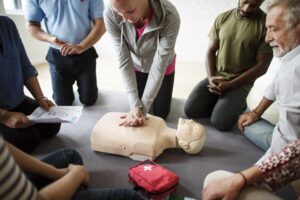When talking about a career in the security industry, one of the first questions asked is whether one should really become a security guard or a security officer. The words can often be synonymous with each other; however, the roles, responsibilities, and training can be completely different. Hence, it is important for you to fully understand these factors if you want to plan out your career pathway in Australia.
What is the Role of a Security Guard
Maybe you are wondering how to become a security guard. It is usually a case of starting with Certificate II in Security Operations. This course equips you with essential skills in crowd control, premises surveillance, and incident response.
Typically, a security guard will be concerned with:
- Protecting property and people
- Monitoring of CCTV and alarms
- Access Control
- Emergency response
But beyond these duties, a security guard’s role is about creating a visible sense of safety. For example, the presence of a uniformed guard at a shopping centre or office building can deter potential offenders before any incident occurs. Guards are often the first people approached in case of confusion or emergency, meaning they also act as customer service representatives and must maintain a calm, professional manner.
Another important aspect of the guard’s role is communication. Guards frequently need to write reports about incidents, keep logbooks of daily activity, and provide clear updates to supervisors or clients. So while much of the work is physical—like patrolling—it also requires strong observation, reporting, and people skills.
What sets Multisec Training apart is that our hands-on approach takes you through the licensing requirements of NSW and teaches you real-world skills in security. This means you don’t just get the theory—you practice situations you’re likely to face on the job, preparing you for a smoother transition into the workforce.
The Role of a Security Officer
If your career goals involve greater responsibility, leadership, or specialised protection duties, you may want to explore how to become a security officer. Security officers often take on more complex roles than guards, including:
Supervising teams of guards
Coordinating security operations
Managing high-risk environments
Liaising with law enforcement
The difference is that while guards are often at the operational level, officers usually function at a management or supervisory level. This means more responsibility, more decision-making, and often more specialised training.
A security officer may be responsible for the safety of VIPs, government officials, or high-value corporate assets. For example, in corporate security or event security, officers may need to coordinate logistics, assess potential threats, and prepare detailed risk mitigation strategies.
This path often requires additional qualifications, such as Certificate III in Close Protection Operations or Certificate IV in Security Risk Analysis. These courses prepare officers to step into leadership positions and work in environments where advanced planning and decision-making skills are crucial.
The Importance of Risk and Security Management Skills
For those aiming for leadership or specialist roles, enrolling in a risk and security management course is a game-changer. Multisec Training offers the Certificate IV in Security Risk Analysis, which covers:
Identifying and assessing threats
Developing a security plan
Managing large-scale events and corporate security operations
Risk management is becoming increasingly important in the modern security landscape. Companies and organisations no longer want just “guards at the door”—they need professionals who can identify potential risks before they occur, create detailed security strategies, and adapt quickly when challenges arise.
For instance, consider a large-scale music festival. A risk management-trained officer won’t just deploy guards; they will assess crowd behaviour, evacuation routes, potential weather issues, and work closely with emergency services. This type of preparation is what makes security not only reactive but proactively protective.
This qualification not only opens doors to higher-paying roles but also positions you as an industry expert in security risk assessment.
Which Course Should You Choose?
The choice between a security guard and a security officer is primarily career-dependent:
Choose the Certificate II if you wish to get into security and learn the basics fast.
Certificate III or IV would be suitable if your intention is to move up into leadership roles or specialise in close protection or risk management.
It’s also worth remembering that these paths are not mutually exclusive. Many professionals begin their careers as security guards, gaining valuable on-the-job experience, and then move into officer roles after completing further study. This staged approach allows you to build confidence, earn while you learn, and steadily progress toward senior positions.
At the Beginning of Your Security Career?
Multisec Training offers nationally recognised courses that really set you up for success, whether you are inquiring about how to become a security guard or how to become a security officer. From entry-level to advanced courses in risk and security management, we will give you the support you need.
Another benefit of choosing Multisec is our strong links with industry employers. Graduates from our programs are in demand because our training is practical, comprehensive, and focused on real-world outcomes. When you enrol with us, you are not just signing up for a course—you are stepping into a career pathway with strong growth potential.
Final Thoughts
The decision between becoming a security guard or a security officer comes down to your long-term goals. If you want to enter the industry quickly and gain experience, start with Certificate II and take on a security guard role. If you aim for greater responsibility, leadership, or specialisation, then continuing to higher qualifications will open the officer pathway.
Whichever route you choose, security is a stable and rewarding career. With increasing demand for skilled professionals across Australia, there has never been a better time to start. By training with Multisec, you’ll gain the qualifications, knowledge, and confidence needed to succeed in a career that protects people, property, and businesses.
Give us a call and let’s discuss your career goals so you can be enrolled in the course that fits them.





